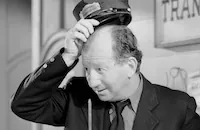On Moonlight Bay

Brief Synopsis
Cast & Crew
Roy Del Ruth
Doris Day
Gordon Macrae
["smiling"] Jack Smith
Leon Ames
Rosemary De Camp
Film Details
Technical Specs

Synopsis
In 1917, banker George Winfield and his family, wife Alice, eighteen-year-old tomboy Marjorie, eleven-year-old Wesley and Max, the dog, move into a big new house. Although everyone, including Stella, the maid, hates the new house and neighborhood, George is determined that his children, particularly Margie, will have the opportunity to meet a better class of people. At his father's urging, Wesley makes friends with Jim Sherman, who offers to demonstrate his father's gun, which, Jim claims, was previously owned by Jesse James. After Margie joins some boys in a baseball game and scores the winning run, she sees Wesley and Jim take the gun into a barn. She runs off to stop them, but manages to accidentally discharge it, causing the barn door to collapse on Jim's older brother William.
Bill initially mistakes Margie for a boy, but soon discovers she is a lovely young woman and comes courting. Equally taken with Bill, Margie enlists her mother's help and is transformed into a more feminine-looking woman. On their first date, Bill, who is a senior at the University of Indiana, claims to believe that the world situation is too serious for any form of entertainment. Nevertheless, he dances with Margie and then offers to win her a doll at a game booth. When he does not succeed, he loudly accuses the barker of running a dishonest game, and to prove his fairness, the man offers Margie three free throws. Tomboy Margie successfully completes them and, after some further argument, is given a doll. By the end of the evening, Bill and Margie have fallen in love. Some time later, George asks Bill what his intentions are toward Margie, and after Bill makes disparaging comments about bankers, George forbids him to see her. Margie's other suitor, stuffy music teacher Hubert Wakley, is more to her father's liking. One day, Wesley, having forgotten to write a letter for a school assignment, steals a love letter Margie is writing to Bill, who is now away at school. He is forced to read it aloud to the class and the romantic language makes him a laughingstock. Blaming Margie for his humiliation, Wesley decides to punish her by disrupting her date with Hubert, not knowing that she cannot stand him, and at the end of the afternoon, Margie rewards Wesley with a big hug. Margie has been secretly taking dancing lessons as a surprise for Bill, whom she has invited to a Christmas dance. On the way home, she is taunted by some boys and, in the ensuing snowball fight, slips and breaks her ankle.
Later, Wesley watches a movie about the destructive effect that drinking has on one family, and when he is caught sleeping in class, spins a story for the teacher, Miss Mary Stevens, about his father's drunken behavior. On Christmas Eve, Bill arrives home and encounters Mary, who repeats Wesley's story. Horrified, Bill marches to the Winfields' house, determined to rescue Margie. Seeing George asleep on the couch, Bill mistakenly believes he is in a drunken stupor and throws a pitcher of water on him. His lie revealed, Wesley runs off to join a group of carolers led by Hubert. At the end of the school year, the Winfields attend Bill's graduation. While Bill makes a speech announcing that his entire class has enlisted in the Army, Margie informs her father that Bill does not believe in marriage, and an appalled George drags his entire family away. A brokenhearted Margie runs away and meets Bill on the troop train. Bill proposes, but George, who has followed her to the train, does not believe he is sincere. Later, on Wesley's twelfth birthday, George's aunt Martha brings Wesley cookies, a knife and a slingshot that she took away from George when he was a boy. During the birthday party, Bill arrives unexpectedly and formally asks George for permission to marry Margie. When George again refuses, Alice reminds him that he was once young and foolish, but it is only after Wesley breaks a window with George's old slingshot that he relents and Bill and Margie are married.

Director

Roy Del Ruth
Cast

Doris Day

Gordon Macrae
["smiling"] Jack Smith

Leon Ames

Rosemary De Camp

Mary Wickes

Ellen Corby

Billy Gray
Henry East
Jeffrey Stevens
Eddie Marr
Esther Dale
Susan Whitney
Ira Buck Woods
Chester Jones
John B. Williams
Sherry Hall
Gayle Kellogg

Sig Arno
Joel Nestler
Michael Miller
John Hedloe
Edmond Penny
Jimmy Dobson
Joe Recht
Bert Davidson
Rolland Morris
Lois Austin
Creighton Hale
Ann Kimball
Ray Spiker

Hank Mann

Jack Mower
Ralph Montgomery
Melodi Lowell
Susan Ridgeway
Ann Moore
Crew
Milo Anderson
George Asaf
Douglas Bacon
Gordon Bau
Marjorie Best
W. J. Callahan
Herschel Daugherty
Peter De Rose
Melvin Dellar
Raymond B. Egan
David Forrest
Franz Gruber
Ernest Haller
Otto Harback
Ray Heindorf
Karl Hoschna
William Jacobs
John William Kellette
Jean Kenbrovin
H. F. Koenekamp
Max Kortlander
Mitchell Kovaleski
Edward Madden
William Mcgann
Joseph Mohr
Felix Powell
Leroy Prinz
Thomas Reilly
Jack Rose
Francis J. Scheid
Melville Shavelson
Max Steiner
Charles Tobias
William Wallace
Pauline Walsh
Raoul Walsh
Percy Weinrich
Richard A. Whiting

Photo Collections
Film Details
Technical Specs

Articles
On Moonlight Bay
The former Doris Kappelhoff started out as a singer with big band legend Les Brown and his Band of Renown at the age of fifteen (her knockout, 5' 7" figure made audiences believe she was much older) before signing on as a contract player at Warner Brothers. During her stint there, she made seventeen movies in seven years, moving "from one sound stage to another, from one contract director to another" at a breakneck, time-is-money pace. Even though she wasn't enchanted with the quality of the scripts (after a blistering encounter with Jack Warner, she never dared to complain about an assignment again), she counted On Moonlight Bay, along with the other nostalgic musicals (Tea for Two (1950), Calamity Jane (1953), and Lullaby of Broadway(1951), among others) as some of the most fun movies she made.
Based on Booth Tarkington's beloved "Penrod" stories about a mischievous boy's humorous exploits in small town American, screenwriting partners Jack Rose and Melville Shavelson - a team Jack Warner addressed as "Hello, boys" even when only one of them was present -- shifted the focus from the title character to his older sister Marjorie at Warner's request, in order to showcase Day. They also were assigned the film's title when Warner asked for a copy of the company's song catalog, stabbed a toothpick at a random title, and announced they had to fit a story around the song "On Moonlight Bay". (Shavelson later remarked dryly, "That was the end of the story conference.") Rose and Shavelson quickly cobbled together a story about a romance between a forthright, baseball-crazy gal Marjorie (Day) and the college boy next door William (Gordon MacRae), who meet when, thinking she's an unruly boy in her baseball uniform, William threatens her with a spanking.
On Moonlight Bay was to be Day's fifth movie with fellow contract player Gordon MacRae (and third directed by Roy Del Ruth), but Day adored MacRae as a co-star and thought he had the loveliest voice in Hollywood. That voice and hers were put to good use in a screenplay packed with hits of the pre-WWI era like "Pack Up Your Troubles in Your Old Kit Bag and Smile, Smile, Smile!" and ""Cuddle Up a Little Closer, Lovey Mine", as well as the title tune that the screenwriters cleverly folded into the story by renaming the amusement park Marjorie and William visit on their first date.
Even though Day was mystified by why the public responded so positively to her "virgin" appeal, there was no mistaking how audiences loved On Moonlight Bay. Variety praised it for " jogging nostalgic memory" and the United States Conference of Catholic Bishops rated it "A-1" (least objectionable & suitable for all) for how the movie "relaxes with the mundane distractions of small-town life, the sweet innocence of period songs and the uncertain course of young love." The Technicolor musical did so well at the box office that Warner Brothers quickly pushed a sequel By the Light of the Silvery Moon into production, taking the extra step of retaining all the lead actors in their original roles.
Producer: William Jacobs
Director: Roy Del Ruth
Screenplay: Jack Rose, Melville Shavelson (screenplay); Booth Tarkington (story)
Cinematography: Ernest Haller
Art Direction: Douglas Bacon
Music: Max Steiner (uncredited)
Film Editing: Thomas Reilly
Cast: Doris Day (Marjorie 'Marjie' Winfield), Gordon MacRae (William 'Bill' Sherman), Jack Smith (Hubert Wakely), Leon Ames (Banker George 'Father' Winfield (Mr. Winfield)), Rosemary De Camp (Alice 'Mother' Winfield (Mrs. Winfield)), Mary Wickes (Stella), Ellen Corby (Miss Mary Stevens), Billy Gray (Wesley Winfield), Henry East (Doughboy by train), Jeffrey Stevens (Jim Sherman).
C-95m.
by Violet LeVoit
References:
Hotchner, A.E. and Doris Day. Doris Day: Her Own Story. 1975, William Morrow and Company, Inc.
Freedland, Michael. The Warner Brothers. 1983, St. Martins Press.
Variety. Sun., Dec. 31, 1950

On Moonlight Bay
Quotes
No man believes in marriage... until a woman traps him into it!- Aunt Martha Robertson
Trivia
Notes
The film's working title was Moonlight Bay. The opening credits are superimposed over period photographs. Hollywood Reporter news items reported that from 2 March-March 8, 1951, director Roy Del Ruth was ill with the flu and Raoul Walsh took over directing duties in his absence. Although their appearance has not been confirmed, according to Hollywood Reporter, Rudi Friml, Jr. and the Bob Mitchell Choir appeared in the picture. On Moonlight Bay marked the first feature film acting role of radio singer Jack Smith (1915-2006), popularly known as "Smiling" Jack Smith. The singer made his feature film debut as himself in the 1947 film Make Believe Ballroom.
In a letter to Jack L. Warner dated October 31, 1950, which was included in the file on the film in the MPAA/PCA Collection at the AMPAS Library, PCA head Joseph I. Breen objected to "William's theorizing against the institution of marriage, and for what amounts to a philosophy of free love. Such subjects are of far too serious a nature to be treated in a comedy atmosphere such as this." In the same letter, Breen also objected to the scene in which "Wesley" and "Jim" take "Jim's" father's gun into the barn. Breen wrote, "We feel it will be necessary to substitute some prop other than a gun for the children to be handling in these scenes. The danger of showing adolescents with guns in their hands is only too clear and we are of the firm opinion that such things should be kept off the screen." According to an article in New York Times, the studio explained that the sequence was a classic of American humor and then proposed substituting a blunderbuss for the pistol. The PCA agreed to the substitution, believing that weapon to be less "gangsterish."
On May 5, 1952, Gordon MacRae, Mary Wickes, Eddie Marr and Billy Gray reprised their roles for a radio adaptation of the film on Lux Radio Theatre. Jane Wyman played Doris Day's role, "Marjorie Winfield." Most of the cast members of On Moonlight Bay appeared together again in Warner Bros.' 1953 sequel, By the Light of the Silvery Moon, which was directed by David Butler (see entry above). For a description of other films based on the Penrod stories, see the entry for Penrod and Sam in AFI Catalog of Feature Films, 1931-40.















